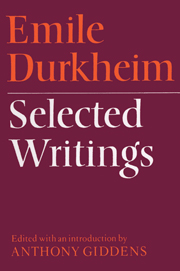Book contents
- Frontmatter
- Contents
- Preface
- Abbreviations
- Introduction: Durkheim's writings in sociology and social philosophy
- 1 The field of sociology
- 2 Methods of explanation and analysis
- 3 The science of morality
- 4 Moral obligation, duty and freedom
- 5 Forms of social solidarity
- 6 The division of labour and social differentiation
- 7 Analysis of socialist doctrines
- 8 Anomie and the moral structure of industry
- 9 Political sociology
- 10 The social bases of education
- 11 Religion and ritual
- 12 Secularisation and rationality
- 13 Sociology of knowledge
- Index
5 - Forms of social solidarity
Published online by Cambridge University Press: 05 August 2012
- Frontmatter
- Contents
- Preface
- Abbreviations
- Introduction: Durkheim's writings in sociology and social philosophy
- 1 The field of sociology
- 2 Methods of explanation and analysis
- 3 The science of morality
- 4 Moral obligation, duty and freedom
- 5 Forms of social solidarity
- 6 The division of labour and social differentiation
- 7 Analysis of socialist doctrines
- 8 Anomie and the moral structure of industry
- 9 Political sociology
- 10 The social bases of education
- 11 Religion and ritual
- 12 Secularisation and rationality
- 13 Sociology of knowledge
- Index
Summary
REPRESSIVE SANCTIONS AND MECHANICAL SOLIDARITY
The link of social solidarity to which repressive law corresponds is one whose break constitutes a crime; we give this name to every act which, in any degree whatever, evokes against its author the characteristic reaction which we term ‘punishment’. To seek the nature of this link is thus to ask what is the cause of punishment, or, more precisely what crime essentially consists in…
… an act is criminal when it offends strong and defined states of the conscience collective. The statement of this proposition is rarely disputed, but it is ordinarily given a sense very different from that which it ought to have. We take it as if it expressed, not the essential property of crime, but one of its repercussions. We well know that crime violates very general and intense sentiments; but we believe that this generality and intensity derive from the criminal character of the act, which consequently remains to be defined. We do not deny that every delict is universally condemned, but we take as agreed that the condemnation to which it is subjected results from its delinquent character. Then, however, we are hard put to say in what its delinquent character consists. Is it to be found in an especially serious transgression? Perhaps so; but that is simply to restate the question by putting one word in place of another, for it is precisely the problem to understand what this transgression is, and particularly this specific transgression which society reproves by means of organised punishment and which constitutes criminality.
- Type
- Chapter
- Information
- Emile Durkheim: Selected Writings , pp. 123 - 140Publisher: Cambridge University PressPrint publication year: 1972
- 3
- Cited by



